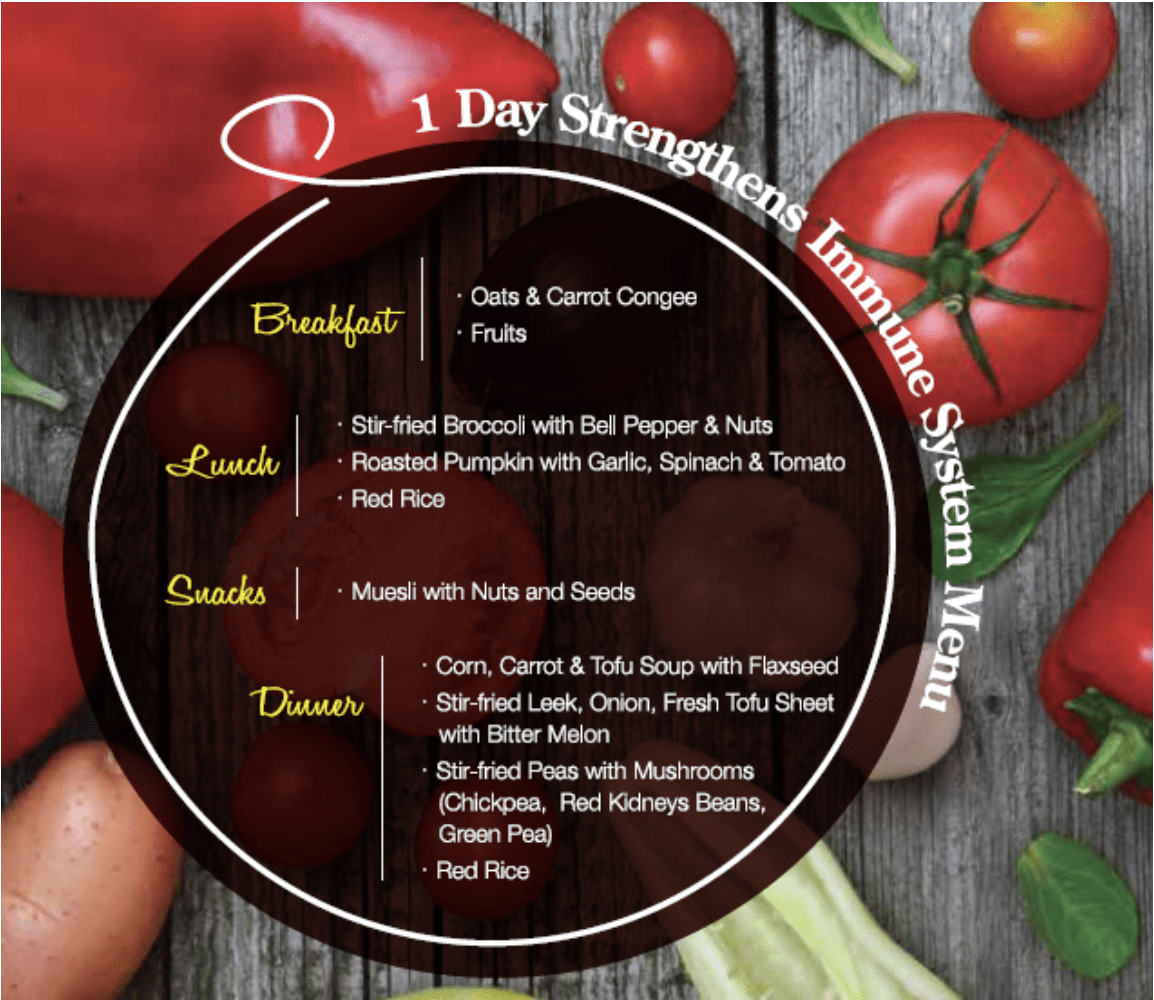
Having healthy immunity is of paramount importance for us to fight against COVID-19. Diet and nutrients play a crucial role in building a strong immune system. The table below shows some important nutrients and food sources that help us boost our immune system:
| Food/ nutrient that boosts your immunity system | Rationale | Sources (Plant-based) |
| Vitamin A/ Beta-carotene | Keep the mucous membrane healthy, strengthen the antibody response, encourage white blood cell production |
Carrot, pumpkin, sweet potato, dark green leafy vegetables |
| Vitamin B (B6, Folate) | Vitamin B6 supports biochemical reactions in the immune system Folate helps body produce DNA and RNA which are essential for the growth and production of white blood cells | B6: Banana, sweet potato, potato, avocado Folate: Leafy green vegetables, citrus fruits, beans |
| Vitamin C | Stimulate the production and function of white blood cells, it also helps the body to produce antibodies | Citrus fruits, bell peppers, kiwi, strawberries, guavas |
| Vitamin D | Strengthen innate immune system and initiate key peptides in the immune system that trigger a strong anti-microbial response | Sunlight, vitamin D-fortified food or supplement |
| Vitamin E | Regulate host immune functions and it is a potent antioxidant | Sunflower seeds, almonds, wheat germ oil |
| Zinc | Deficiency affects the production of T helper cells | Whole grains, tofu, tempeh, legumes, nuts and seeds |
| Selenium |
For the proper functioning of neutrophils, macrophages, natural killer cells and T lymphocytes |
Brazil nuts, sunflower seeds, mushrooms, beans and lentils |
| Probiotics | Promote the production of natural antibodies and boost immune cells | Miso, natto, tempeh, soy yogurt, sauerkraut and fermented food |
| Garlic |
Boost the disease-fighting response of some types of white blood cells |
- Garlic contains alliin - When garlic is crushed, alliin turns into allicin - Allicin has antiviral, antifungal and antibacterial properties - After crushing garlic, let it stand for 10 minutes to increase the formation of allicin |
In addition to nutrition and diet, lifestyle management is another vital factor that helps us build strong immunity. There are some lifestyle habits that will weaken our immunity, as mentioned in the table below:
| Lifestyle That Weakens Your Immunity System | Rationale |
| Smoking and Drinking | Reduce the number and function of immune cells |
| Not Getting Enough Sleep | Suppress immune function |
| Lack of Exercise | Slower circulation of white blood cells and antibodies |
| Diet High in Refined Sugar | Excessive refined sugar drops the ability of white blood cells to engulf bacteria / virus |
| Stress | The stress hormone corticosteroid can suppress the effectiveness of the immune system by lowering the number of lymphocytes |
| Isolation and Loneliness | Feeling lonely seems to increase inflammation and lower levels of antiviral compounds in the body; but in the case of COVID-19 outbreak, it's best to minimize social activities to slow down the spread of the virus |

Recipe 1: Stir-fried Broccoli with Bell Pepper & Nuts
Ingredients: Garlic, Nuts, Bell Peppers, Broccoli, Onion, Dried Tofu, Assorted Mushrooms, Olive Oil, Spring Onion
Cooking Methods:
- Steamed mushrooms and broccoli to partially cooked
- Stir-fried garlic, onion, spring onion and the rest of ingredients. Then season them with salt, pepper and soya sauce
- Sprinkle nuts over the top
Recipe 2: Roasted Pumpkin with Garlic Spinach & Tomato
Ingredients: Garlic, Spinach, Cherry Tomatoes, Pumpkin, Sunflower Seeds, Pine Nuts, Olive Oil, Chili, Basil, Scallion, Spring Onion
Cooking Methods:
- Roast cherry tomato and pumpkin
- Stir-fried garlic, scallion, spring onion, basil and chili with olive oil, add roasted cherry tomato & pumpkin. Then season them with salt, pepper and vegetarian oyster sauce
- Sprinkle pine nuts over the top
A Very Important Link: Good Mental Health and High Immunity
A very long time ago, a wise man said that "a cheerful heart is good medicine, but a crushed spirit dries up the bones". While he may have been ahead of his time, the current world situation tells us that his words are now truer than ever. Despite the fact that there is no universal or comprehensive definition of mental health, people in the health sciences and other helping professions seem to agree that mental health is a positive state in which one is accountable or responsible, displays self-awareness, is self-directive, is reasonably worry free, and can cope with the usual daily challenges. Such individuals function well in society, are accepted within a group, and are generally satisfied with their lives (Shives, 2005).
Studies over the last few decades have provided sufficient evidence that mental health influences our immune system. For instance, Dr. Solveig Klaebo Reitan, an associate professor at the Norwegian University of Science and Technology has been involved in a research project that addresses the connection between psychoses and the immune system. "We know that people with mental disorders are also more susceptible to various inflammations in the body and to immune system disorders. This indicates that an interaction exists," says Dr. Klaebo Reitan (Norwegian SciTech News, 2019). The opposite applies too, of course. We also know that people who have been subjected to neglect or childhood abuse are more susceptible to various diseases of the immune system.
Prof. Fulvio D'Acquaito, a renowned researcher at University of Roehampton in London, England, claims that "If immune cells have different "personalities" just like human beings do, one might wonder if there is a correlation between psychological and immunological personality. A recent meta-analysis investigated whether the five basic personality traits-often referred to as the "Big 5" personality traits (openness to experience, conscientiousness, extraversion, agreeableness, and neuroticism)-have specific immunological features or defined susceptibility to immune disorders (D'Acquisto, 2017).
Knowing the essential importance of physical health, we should all make sure that we also look after our mental health. Here are some simple steps we can all take to ensure good mental health:
- BE OPEN TO TALK ABOUT OUR FEELINGS
- KEEPING ACTIVE, LEARNING, STUDYING, ART…
- KEEPING IN TOUCH WITH THOSE WE LOVE
- PROPER EATING
- ASKING FOR HELP WHEN WE FEEL THAT WE CAN'T GO ON
God, in his wonderful love for us reminds of the following: "Dear children, I pray that you may enjoy good health, and that all may go well with you, even as your soul is getting along well." (3 John 1 :2)















